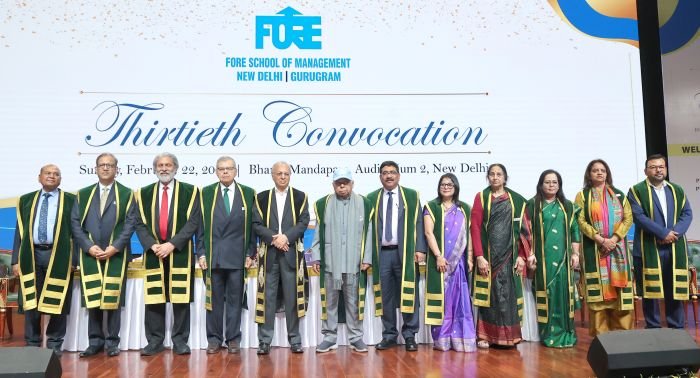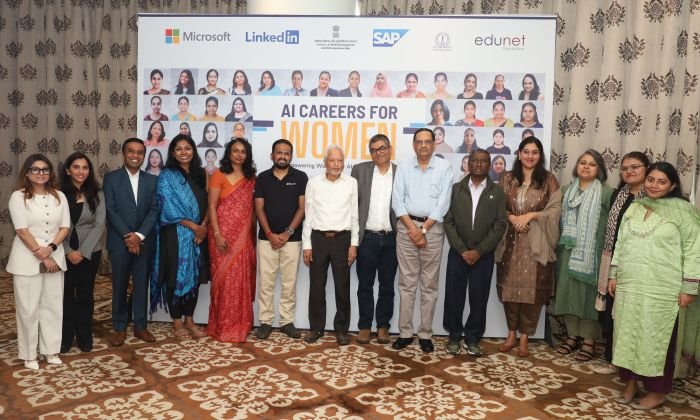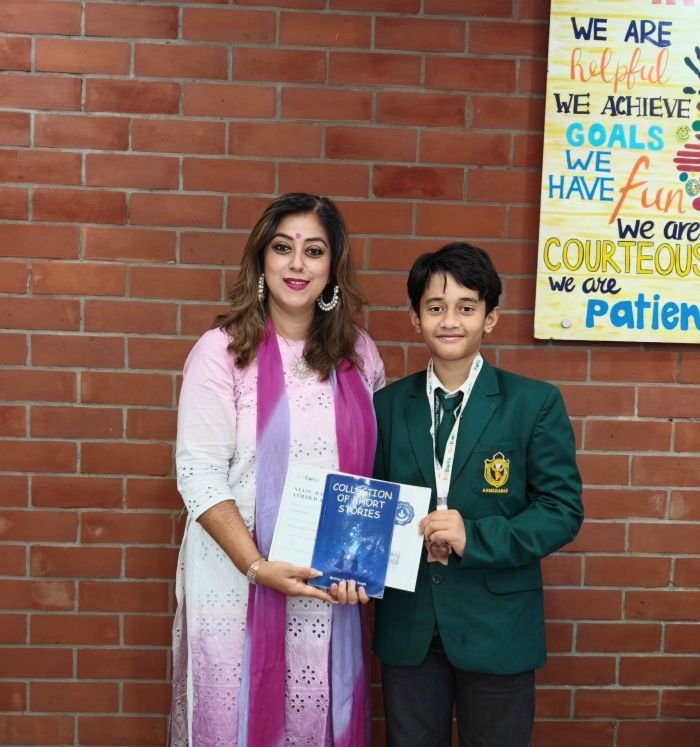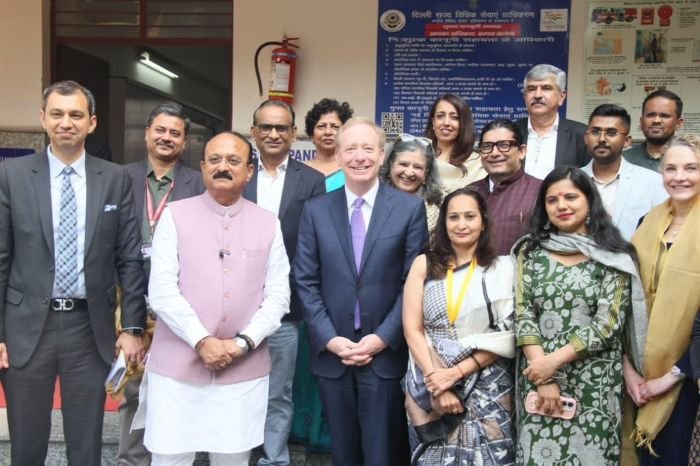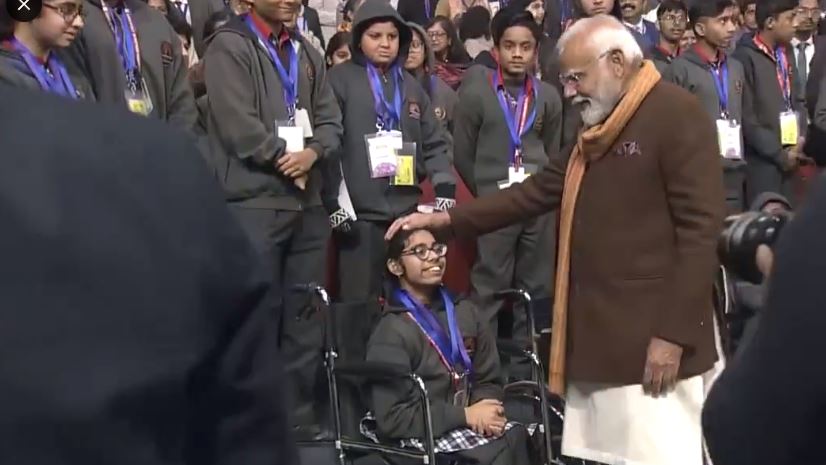
The Prime Minister, Narendra Modi interacted with students, teachers and parents during the 7th edition of Pariksha Pe Charcha (PPC) at Bharat Mandapam in New Delhi on Jan 29. Addressing the town hall, the Prime Minister using questions as cues, elaborated on a variety of sub-themes for close to one hour holding attention of the audience with a lot of motivational talk and personal experiences. Here is a snapshot of his answers.
External pressure and stress
Prime Minister highlighted the role of teachers in mitigating the impact of added pressure from external factors upon students and also pointed out that parents have experienced this from time to time. He suggested making oneself capable of handling pressure and preparing for it as a part of life. The Prime Minister urged the students to prepare themselves mentally by giving the example of travelling from one extreme climate condition to the other where the mind already prepares to face extreme weather conditions. He also suggested assessing stress levels and moving forward by gradually incrementing it so that the student’s ability is not hampered by it. Shri Modi urged the students, families and teachers to collectively address the issue of external stress while evolving the process rather than implementing a systematic theory. He also suggested that families of students should discuss different ways that work for each of them.
Peer pressure and competition among friends
Addressing the issue of peer pressure and competition among friends, Prime Minister highlighted the importance of competition however, he emphasized that competition should be healthy. He pointed out that often the seeds of unhealthy competition are planted in the family situations leading to perverse competition among the siblings. PM Modi asked the parents to avoid comparison among the children. The Prime Minister gave an example of a video where children prioritized helping each other while competing in a healthy manner. He said that doing well in exams is not a zero-sum game and competition is with oneself as good performance by a friend does not restrict the field to do well. This tendency, said the Prime Minister, may give rise to a tendency to befriend those who will not be an inspiring company. He also asked the parents not to compare their children with other children. He also asked them not to make the achievement of their children their visiting card. PM Modi asked students to rejoice in the success of their friends.”Friendship is not a transactional emotion’, the Prime Minister said.
Role of teachers in motivating students
Throwing light on the role of teachers in motivating students, the Prime Minister underlined that music has the capability to relieve the stress of students who not only belong to one class but the entire school. Shri Modi emphasized gradually expanding the student-teacher association right from the first day of class to the time of the exam and said that it would completely eliminate stress during exams. He also urged the teachers to become more accessible to students rather than associating with them on the basis of subjects taught. Giving the example of doctors who have a personal connection with their patients, the Prime Minister said that such a bond acts as half the cure. He also suggested developing a personal connect with the families and appreciating the students for their achievements before them. “Teachers are not in a job role but they shoulder the responsibility of grooming the lives of students”, PM Modi added.
Dealing with exam stress
When asked about dealing with exam stress, the Prime Minister emphasized the need to avoid mistakes due to over enthusiasm of the parents or over sincerity of the students. He asked the parents not to over-hype the exam day by new clothes, rituals or stationery. He also asked the students not to keep preparing until the last moment and approach exams with a relaxed mindset and to avoid any external destruction that can lead to unwanted tension. The Prime Minister advised them to read the question paper and plan with time allocation to avoid panic at the last moment. The Prime Minister reminded the students that most of the exams are still written and the habit of writing is declining due to computers and phones. He asked them to stay in the habit of writing. He asked them to devote 50 percent of their reading/study time to writing. He said only when you write something you truly understand that. He asked them not to be panicked by the speed of the other students.
Maintaining healthy lifestyle
Raising the issue of striking a balance between exam preparation and maintaining a healthy lifestyle, PM mentioned the need to recharge mobile phones to illustrate the need to take care of physical health. He asked for maintaining a balanced lifestyle and avoiding excess of everything. “Healthy body is critical for a healthy mind”, PM Modi said. He said being healthy requires some routines and asked about spending time in sunlight and getting regular and complete sleep. He pointed out that habits like screen time are eating into the required sleep which is considered very important by modern health science. The Prime Minister said that in his personal life too he has maintained a system of going into deep sleep within 30 seconds of going to bed. “Awake fully when awake and sound sleep while asleep, is a balance that can be achieved”, he said. Speaking about nutrition, PM Modi stressed the balanced diet. He also emphasized the importance of regular exercise and physical activities for fitness.
Career progression
Giving insights on career progression, the Prime Minister suggested attaining clarity when it comes to career path and avoiding confusion and indecisiveness. Giving the example of cleanliness and the Prime Minister’s resolve behind, PM Modi underlined that ‘Swachhata’ is becoming a priority area in the nation. He informed that India’s market in the art and culture sector has grown 250 times in the last 10 years. “If we have the capability, we can liven up anything”, PM Modi said urging students to not underestimate themselves. He also suggested going all in with full dedication. Speaking about the National Education Policy, the Prime Minister highlighted the provisions to adopt different courses rather than being bound by a single stream. He lauded the participation, skill and dedication of students in the exhibition showcased on the occasion and underlined that the work done by them to communicate government schemes is much better when compared to the Ministry of Information and Broadcasting of Government of India. “We must be decisive to eliminate confusion”, PM Modi said, giving the example of ordering food in a restaurant where one must decide on what to eat. He also suggested evaluating the positives and negatives of the decisions to be made.
Role of Parents
The Prime Minister touched upon the trust deficit in families and asked the parents and teachers to tackle this serious issue. He said that this deficit is not sudden but is a result of a long-drawn process and requires a deep self-analysis of everyone’s conduct, be it teachers, parents or students. Honest communication can reduce the chances of trust deficit, he said. Students should be sincere and honest in their dealings. Similarly, parents should also convey their confidence in their children instead of suspicion. The distance created by the trust deficit can push children into depression. The Prime Minister asked the teachers to keep channels of communication open with the students and avoid favoritism. He asked for an experiment and requested families of friends to regularly meet and discuss positive things that can help children.
Intrusion of technology
“Excess of anything is bad”, the Prime Minister said drawing an analogy to excess mobile phone usage with home-cooked meals which when taken in excess can lead to stomach problems and other issues, even though it is rich in nutrients. He stressed making effective use of technology and mobile phones with the help of judgement-based decision-making. “Every parent faces this issue”, the Prime Minister said pointing out the subject of privacy and secrecy. He stressed formulating a set of rules and regulations in the family and mentioned no electronic gadgets during dinner and creating no gadget zones in the house. “In today’s world”, the Prime Minister said, “one cannot run away from technology.” He said that it should not be considered a burden but it is mandatory to learn its effective usage. The Prime Minister suggested students educate their parents about technology being an educational resource and also recommended sharing the passcodes of every mobile phone in their homes with every member to establish transparency. “This would prevent a lot of evils”, he added. Prime Minister Modi also touched upon monitoring screen time with the use of dedicated mobile applications and tools. He also suggested educating the students about the resourcefulness of mobile phones in the classroom.
How does the Prime Minister handle stress and stay positive?
The Prime Minister said that it is good to know that children know the pressures of the position of the Prime Minister. He said that everyone faces unforeseen situations. One can react to them by avoidance, however, said the Prime Minister, such people are not able to achieve much in life. “My approach which I found useful is that ‘I challenge every challenge’. I do not wait passively for the challenge to pass. This gives me an opportunity to learn all the time. Dealing with new situations enriches me”. He further said “My biggest confidence is that I have 140 crore countrymen with me. If there are 100 million challenges, there are billions of solutions. I never find myself alone and everything is on me, I am always aware of the capabilities of my country and countrymen. This is the fundamental crux of my thinking”. He said that though he will have to be at the forefront and mistakes will be his but the capabilities of the nation give strength. “The more I enhance the capabilities of my countrymen, my ability to challenge the challenges improves”, he said.
Furthermore, the Prime Minister said that one should have the wisdom to prioritize things. This comes with experience and analyzing everything. He also said that he considers his mistakes as lessons. He said for proper governance also, there should be a system of perfect information from bottom to top and a system of perfect guidance from top to bottom.
The Prime Minister emphasized not being disappointed in life and said that once this decision is made, only positivity remains. “I have shut all doors and windows of disappointment in my life”, the Prime Minister said. He said that decision-making becomes easier when the resolve to do something is strong. “When there is no selfish motive, there is never confusion in decision”, he said. Giving emphasis on making the lives of the present generation easier, the Prime Minister expressed confidence that the generation of today must not face the difficulties faced by their parents. “Government strives to make a nation where not just the present but future generations have a chance to shine and show their capabilities”, the Prime Minister said stressing that it should be the collective resolve of the entire nation. Throwing light on the power of positive thinking, the Prime Minister said that it gives the strength to look for positive outcomes even in the most negative situations. The Prime Minister concluded his interaction by encouraging all students and conveyed his best wishes to achieve their life goals.


